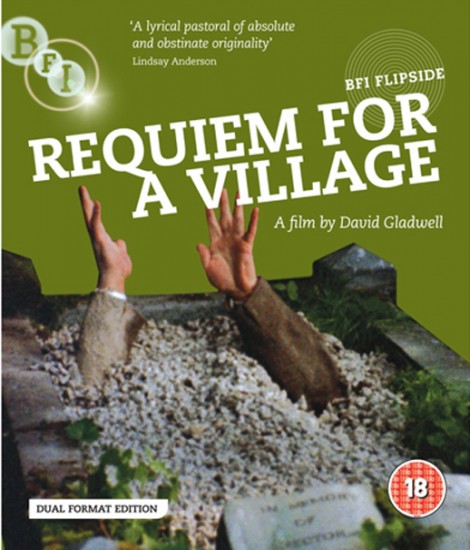
As the list of DVD titles from the BFI grows ever more interesting we decided we should be stocking them in our shop and a good place to start is with this, the recently released ‘folk film’, Requiem For A Village. It’s a strange and wonderful thing for which Electric Eden author Rob Young has provided an essay in the accompanying booklet. The BFI have kindly allowed us to print an extract:
Requiem for a Village: Cinema of the Anti-Scrape:
Requiem can be seen as a summation of a string of disconnected films made in the first half of the 1970s, all in various ways concerned with the precarious status of rural and community life in England. Its closest parallel is Akenfield (Peter Brook, 1974), filmed at Charsfield in Suffolk, a short distance from Requiem’s Witnesham. Like Requiem, Akenfield is an essay on the relationship of the country and city couched in a trans-generational fiction, using non-professional local participants, and which revels in the textures, sounds and colour palette of the Suffolk countryside. Penda’s Fen (Alan Clarke, 1974), a BBC Play for Today, is a meditation on the English condition, and contains another sequence featuring a figure from the past – in this case, the pagan king Penda of Mercia – bursting out of the earth to bring guidance to would-be radicals of the modern age. In the same period, John Betjeman was making a series of films nostalgic for forgotten corners of landscapes and villages, and hymning ancient institutions and rural branchlines, such as Metroland (1973), A Passion for Churches (1974) and Summoned by Bells (1976). It’s also instructive to view Gladwell’s film in the light of the Suffolk Horse Fairs, held annually at villages such as Barsham in the early 1970s, recreating the flavour of medieval pageants and Victorian steam fairs with jousting, hog roasts, folk theatre and military re-enactments – portals to the imagined golden age of ‘Merrie England’. Gladwell’s signature slow-motion footage intensifies the sense of the past made strange, lending an enchanted, supernatural air to the shoeing of a horse or the casting of a cartwheel. Peter Kennedy’s anthropological film of the Padstow May Day festivities, Oss Oss Wee Oss (1953), coolly gazes upon mysterious Cornish customs and traditions, emphasising the weirdness of folkloric survivals. Irrupting into the silent, mesmeric activity ride the Triumph-riding Hell’s Angels of death, who rip through the country lanes and vibrate the air with noise in an audio-visual allusion to the biker gang led by Oliver Reed in Joseph Losey’s The Damned (1961).
Rob Young is The Wire magazine’s editor-at-large and contributes to various publications including Uncut and Sight & Sound. His latest book, Electric Eden: Unearthing Britain’s Visionary Music, was published in 2010.
Requiem For A Village, is on sale from the Caught by the River shop, priced £19.99